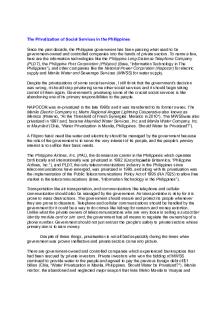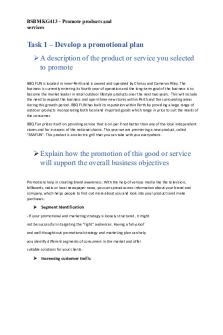Retailing includes all the activities involved in selling products or services directly to final consumers for their PDF

| Title | Retailing includes all the activities involved in selling products or services directly to final consumers for their |
|---|---|
| Author | Cana Goose |
| Course | Marketing Management |
| Institution | Northern Alberta Institute of Technology |
| Pages | 3 |
| File Size | 196.2 KB |
| File Type | |
| Total Downloads | 11 |
| Total Views | 123 |
Summary
Retailling...
Description
Retailing includes all the activities involved in selling products or services directly to final consumers for their, personal nonbusiness use. Retailers are businesses whose sales are primarily from retailing. - Many apply Shopper marketing: focusing the entire marketing process into turning shoppers into buyers as they approach the point of sale, whether in store online or mobile shopping. Shopper marketing is different from normal marketing as it usually focuses around the shopping process itself. - Today’s consumers are increasingly omni-channel buyers who make little distinction between buying in-store or online. Omni-channel retailing creates a seamless cross-channel buying experience that integrates in-store, online and mobile marketing shopping. Below you can see some examples of the types of retailers as well as the categories of service that they can provide
And the services: - Self service retailers: serve customers who are willing to perform their own locate-compare-select process to save time or money (For example, IKEA) - Limited service retailers: provide more sales assistance because they carry more shopping
goods about which customers need information. Higher operating costs results in higher prices - Full-service retailers: Assist customers in every phase of the shopping process. Specialty goods. Apart from different types of retailers, there are also multiple organizational forms for them, listed below.
Wholesaling includes all the activities involved in selling goods and services to those buying them for resale or business use. Firms engaged primarily in wholesaling activities are called wholesalers. A producer would use wholesalers rather than selling directly to retailers or consumers because wholesalers add value by performing one or more of the following channel functions: Selling and promoting: help manufacturers reach many small customers at a low cost Buying and assortment building: wholesalers can select and build assortments based on their customer’s needs. Bulk breaking: can save customers money by buying in extremely large amounts and breaking them down into smaller, but still relatively big amounts. Warehousing: wholesalers hold relatively large amounts of stock, thereby reducing inventory costs for retailers.
Transportation: Wholesalers can provide quicker delivery as they are closer to the retailer than producers. Financing (fuck finance 1): wholesalers can absorb risk by taking title and bearing the cost of giving their customers credit, and finance their suppliers by ordering early and paying bills on time. Risk bearing: wholesalers absorb risk by taking title and bearing the cost of theft, damage, spoilage and obsolescence. Market information: Wholesalers can provide information to customers about new products, competitors and price developments and other useful information that is not directly available to retailers. Management services and advice: wholesalers can setup their business in such a way that they can improve store layouts for retailers, train their service clerks on being knowledgeable on certain items as well as helping with setting up inventory management systems....
Similar Free PDFs
Popular Institutions
- Tinajero National High School - Annex
- Politeknik Caltex Riau
- Yokohama City University
- SGT University
- University of Al-Qadisiyah
- Divine Word College of Vigan
- Techniek College Rotterdam
- Universidade de Santiago
- Universiti Teknologi MARA Cawangan Johor Kampus Pasir Gudang
- Poltekkes Kemenkes Yogyakarta
- Baguio City National High School
- Colegio san marcos
- preparatoria uno
- Centro de Bachillerato Tecnológico Industrial y de Servicios No. 107
- Dalian Maritime University
- Quang Trung Secondary School
- Colegio Tecnológico en Informática
- Corporación Regional de Educación Superior
- Grupo CEDVA
- Dar Al Uloom University
- Centro de Estudios Preuniversitarios de la Universidad Nacional de Ingeniería
- 上智大学
- Aakash International School, Nuna Majara
- San Felipe Neri Catholic School
- Kang Chiao International School - New Taipei City
- Misamis Occidental National High School
- Institución Educativa Escuela Normal Juan Ladrilleros
- Kolehiyo ng Pantukan
- Batanes State College
- Instituto Continental
- Sekolah Menengah Kejuruan Kesehatan Kaltara (Tarakan)
- Colegio de La Inmaculada Concepcion - Cebu















